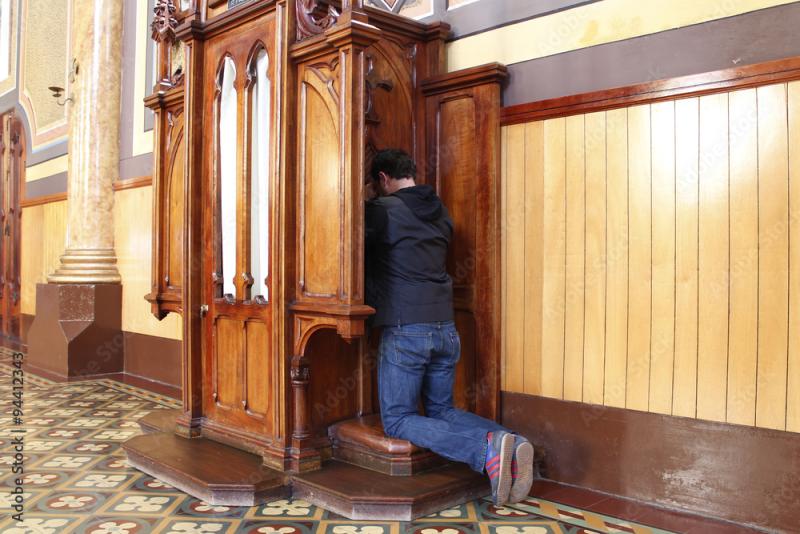A bill aiming to change child abuse reporting law by ending the privilege between a priest and a penitent during confession awaits action in committee.
Introduced March 2 by prime sponsor Rep. Eric Morrison, D-Glasgow, House Bill 74 would change a centuries-old protection covering anything said in confession, a sacrament between the person, the priest and God.
Morrison said a constituent raised the issue with him over concerns that Delaware has a carve-out in its child abuse law that allows anything said during confession to remain between a penitent and their priest. Morrison’s bill would end the carve-out protection and would require a priest to report to police if someone admits they abused a child or worse.
“It’s a carve-out specifically for priests in a confessional setting, but for the most part in Delaware, of course, that’s going to mean the Catholic church. Another one of my issues with this is that it doesn’t apply to any other religions,” said Morrison.
He also said race may be at the root of the confession exception, since nationally only 3% of Blacks are Catholic and Asians make up another 3%. Nationwide, he said, 17 states do not carve out exceptions for priests in a confessional setting, while 33 do. Delaware is among several states with proposed legislation to end the confessional exception.
For now, Morrison said he is talking to other legislators about the bill and looking to line up expert witnesses and other public comment.
“I’ve heard from people who very much appreciate me introducing this legislation and I’ve also heard from people who don’t like this legislation,” he said. “That’s to be expected. This is a piece of legislation that people on both sides feel very strongly and passionate about for their own reasons, and I respect that.”
Morrison said the Catholic church has organized strong opposition for this bill through newsletters and other communications.
The Catholic Diocese of Wilmington issued a statement March 7 opposing the bill. In it, officials say the sacrament of confession is a fundamental tenet of the church, which the bill would violate. The seal of confession is sacred for priests, and breaking it would incur an automatic excommunication that could only be pardoned by the pope. “It is nonnegotiable. No Catholic priest or bishop would ever break the seal of confession under any circumstances,” the statement reads.
Priests are already mandatory reporters under Delaware’s child abuse reporting law in all circumstances other than the sacrament of confession, the statement reads, and the Diocese of Wilmington’s own internal policies require all clergy to report suspected incidents of child abuse to civil authorities.
“While we support initiatives to make Delaware a safer place for minors and vulnerable adults, HB 74 would not contribute to such efforts in any meaningful way. HB 74 would not only infringe on the rights of a variety of faith communities, it would also give rise to a number of unintended consequences. Among them would be creating a requirement in law that would be nearly impossible to meet in a practical sense,” the statement reads. “The Diocese of Wilmington considers the protection of the vulnerable to be one of the most important aims of public policy. However, this legislation would not advance that vital objective.”
Father William Cocco of St. Edmond Roman Catholic Church in Rehoboth Beach said in his 18 years as a priest, he knows of no one who has ignored someone confessing to child abuse. “I’m not saying this is between you and I, and we’re not going to tell anybody, and that’s the end of it,” he said. “If someone came to confession and said that, it’s not like we wouldn’t do anything.”
But, he said, he stands by the seal of confession and the anonymity it allows.
If someone were to share abuse of a child with him, Cocco said, he would do everything he could to get the person the help they need, even if it meant taking them to talk to authorities.
While acknowledging that the church is not without flaws, most markedly the past sexual abuse scandals that rocked congregations across the country, Cocco said he knows of no priests today covering up the crime of child abuse.
“I think you owe it to the argument to say you have 50 people here who said they went to priests and told them of abuse and they did nothing,” he said. “Are they saying that many, many people are going to confession and the priest is not doing anything, not helping? … I don’t see any evidence of that. If you can come forward and prove and show that because of [the anonymity of confession] there are pedophiles being protected, then there’s an argument or discussion to be had, but I just don’t see where that’s happening.”
Cocco also questioned the impetus behind the bill. “There are certainly a lot of people who have an ax to grind against the Catholic church,” he said. “Is this another way of attacking the church?”
The diocese says the bill is a violation of freedom of religion guaranteed under the First Amendment. ”It would be a clear violation of the First Amendment for the government to interfere in this most sacred and ancient practice of our faith,” the diocese said in its statement.
A public hearing on the bill was posted for March 29 in the House Judiciary Committee, but was later changed.
Melissa Steele is a staff writer covering the state Legislature, government and police. Her newspaper career spans more than 30 years and includes working for the Delaware State News, Burlington County Times, The News Journal, Dover Post and Milford Beacon before coming to the Cape Gazette in 2012. Her work has received numerous awards, most notably a Pulitzer Prize-adjudicated investigative piece, and a runner-up for the MDDC James S. Keat Freedom of Information Award.























































